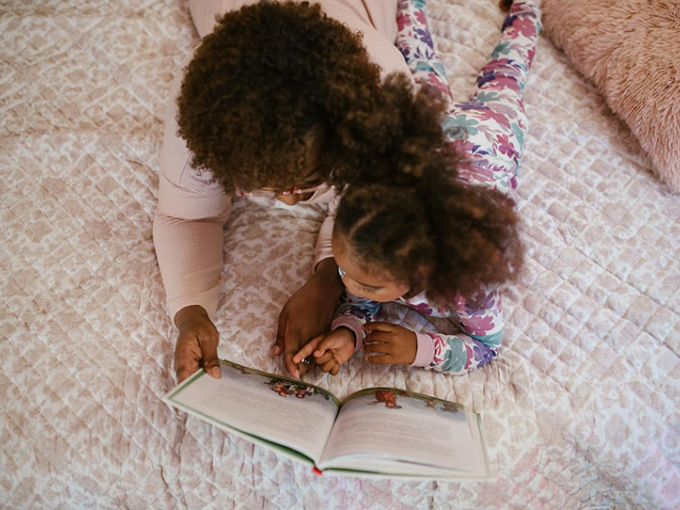
National and international events such as World Book Day help encourage a love of reading and support literacy. Studies have found consistent relationships between early shared reading in the home and later literacy and language skills. Early childhood is an important time to lay down good practices of book reading in the home, particularly as children’s vocabularies at this stage grow at a very fast pace.
However, in addition to supporting language and literacy skills, reading with young children also supports many aspects of cognitive and socio-emotional development too. Research has shown positive associations with skills such as joint attention, concept formation and numeracy, as well as supporting the development of self-esteem and attachment bonds. More information about the benefits of shared reading early are available in this article: Hoyne & Egan, 2019.
There are many benefits of shared reading in early childhood, and it’s never too early to start reading with infants either. Research from the Growing Up in Ireland Study (see Murray & Egan, 2014) showed that infants who were read to had higher communication and problem solving skills than those who were not read to. This finding held even after other factors were accented for that influence cognitive development, such as whether or not the child was breastfed or the mother’s level of education.
Other research conducted with Irish infants (O’Farrelly et al. 2018), in an early intervention programme, also found benefits when an infant was read to daily at 6 months old. By 12 months of age they had higher levels of vocabulary, cognitive and socioemotional skills, compared with infants that were rarely or never read to. There are many benefits for infant development from shared book reading experiences in the first year of life.
However, the Growing Up in Ireland study, which included over 9,000 infants, also showed that while 80% of 9 month old infants were read to, 20% were not. One way that reading with infants might be encouraged is through infant book gifting schemes. Family literacy programmes that involve bookgifting have shown many positive outcomes. These are programmes that provide free books to families. Many countries have programmes that run nationwide (Bookstart in the UK) and Ireland has some programmes that run in particular areas (e.g. Bookseed in Limerick, Books4Babies in Wexford, Dolly Parton Imagination Library in Dublin and Cork).
As an intervention, book gifting schemes can also help bridge the gap between literacy practices in the home and school by providing families with strategies to support their child’s emerging literacy. Other positive impacts of book gifting programmes are that they are centred on the important relationship between the parent and child in the home. Many benefits have been found to these gifting programmes, including the emotional closeness that develops from sharing books at home. For a review of national and international book gifting schemes see Egan et al. 2020.
International and national evidence demonstrates that reading with infants and young children is associated with many developmental benefits. In addition to benefiting development during infancy, the broader research on reading with children suggests it has many longer term benefits also, including for academic outcomes. Baby book gifting schemes are a good way to encourage and support parents to read with their infants from the earliest stage. It would be great to a see a nationwide scheme available in Ireland, building on the success of the local schemes available, such as Bookseed in Limerick.
Dr Suzanne M. Egan



